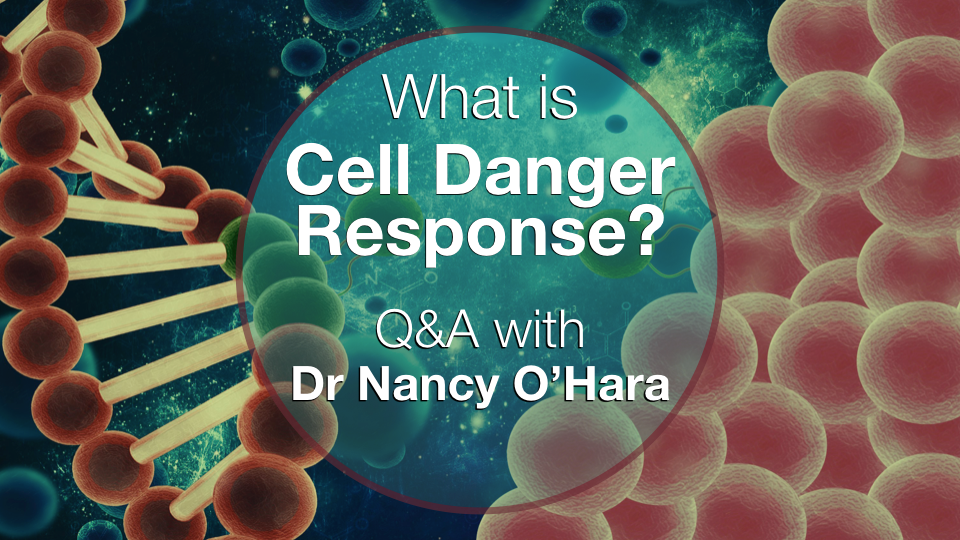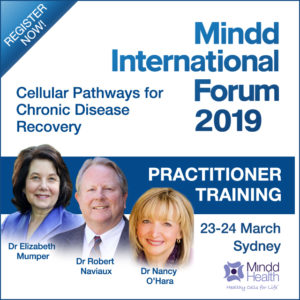We asked Dr Nancy O’Hara some questions regarding the Cell Danger Response – which is a hot topic for this year’s MasterClasses at the Mindd International Forum
Mindd International Forum, 23-24 March (Live in Sydney, Australia and Livestreaming globally)
Certified practitioners who pass the assessment will be listed at mindd.org. A certificate of completion will be provided for CPD applications.
Dr Nancy O’Hara is a board certified Pediatrician. She also has a Master’s degree in Public Health and entered general practice in 1993. Since 1999 Dr O’Hara has dedicated her functional medicine practice to the integrative and holistic care of children with chronic illness and neurodevelopment disorders. She is also a leader in the training of clinicians and is a member of the Mindd Foundation Advisory Board.
Many of the concepts covered below will be discussed in Dr O’Hara’s Presentations at the 2019 Mindd International Forum. Dr Nancy O’Hara will present with her colleagues Dr Elizabeth Mumper and Dr Robert Naviaux. Practitioners will get real answers and clinical tools that can be applied to their everyday practice.
What is the Cell Danger Response?
Dr Nancy O’Hara: “The cell danger response is something that all of us have within our cells every single moment of every single day. It is how we function and how each of us handles stressors, viruses, chemicals, toxins and anything that comes into our system that we need to get rid of.
Let’s just say I get exposed to a virus. My body and mitochondria within the cells react to that virus-like an army reacts to the enemy. The virus is fought, it goes away and the army retreats. The cell danger response is the army; then it retreats and we go back to homeostasis. The same thing happens with a chemical. The chemical is no longer there after we send out our cell danger response and we go back to our normal state of homeostasis.”
What happens with the Cell Danger Response when there is a Chronic Illness present?
“Those of us who deal with a chronic illness such as autism, other neurodevelopmental problems or any type of chronic illness is experiencing a dysfunctional and persistent cell danger response as the core problem.
When there is chronic illness, the cell danger response persists. Let’s use autism as an example as it’s a condition I am familiar with. Let’s say a virus comes in and the cell danger response reacts. The army sentries go out and our mitochondria release cytokines to fight the virus in children or adults with chronic illness. This results in the cell danger response persisting and constantly being in that fight or flight mode, trying to fight a virus that isn’t there. This causes a heightened level of inflammation and adrenal stress with an inability to turn off. When this happens our system is in a state of disarray and dysregulation.”
Learning Objectives for the Cell Danger Response at the 2019 Mindd Forum?
“In order to treat a persistent cell danger response, we need to figure out ways to turn it off. At the Mindd forum in March, we will be addressing how to first recognise the persistent cell danger response and how to treat it to help combat ALL chronic illness. Practitioners will learn treatment not just for those that have to deal with neurodevelopmental problems such as autism spectrum disorder, ADHD and Lyme disease, but also chronic fatigue syndrome, diabetes, asthma, allergies, motor neuron disease and all autoimmune and immune system dysregulation.”
Cell Danger Response in Summary
- The cell danger response relates to our ability to handle everyday stressors, viruses, chemicals and toxins
- Chronic illness can be related to a dysfunctional cell danger response
- The cell danger response is activated to fight the foreign invader, however, when chronic disease is present it stays active and fighting and doesn’t return to homeostasis
- This persistent fight or flight mode results in an increased level of inflammation
Dr O’Hara’s other presentations include:
- Chronic Immune System Activation/Chronic Inflammatory Response Syndrome
- POTS & Dysautonomia
- PANS, PANDAS & Beyond
- Lyme: It is in Australia
- Trust Your Gut: Celiac & Non-Celiac Gluten Sensitivity
- Making the Grade: ADHD without drugs







